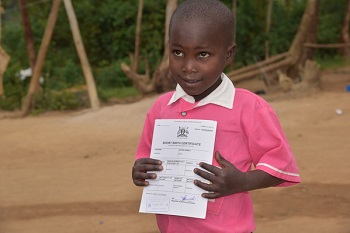Crisis of invisibility in Sub-Saharan Africa: Less than 1 in 2 births registered
At current rates 115 million children will be unregistered by 2030
95 million children have not had their births registered across Sub Saharan Africa, and if decisive action is not taken, these numbers will soar to 115 million by 2030, UNICEF said on Dec 07.

Pupils of Jovia Nursery and Primary School in Kyanangozi village, Kisekka S/C in Lwengo district in posession of birth certificates.
UNICEF released this data at the ongoing 4th Conference of African Ministers Responsible for Civil Registration and called on African countries, so as to prioritise birth registration as a first and critical step to a functional national Civil Registration and Vital Statistics system.
“Such levels of invisibility cannot persist. The cost is too high,” said Leila Pakkala, UNICEF Regional Director for Eastern and Southern Africa. “With no proof of identity, proof of age, nor of nationality, an unregistered child is vulnerable to violations such as child marriage, child labour and recruitment to armed forces.”
UNICEF said a trend analysis showed that birth registration coverage rates have not improved across Sub-Saharan Africa over the last 16 years. A rapidly growing child population, coupled with current trends of slow rates of change means there could be close to 115 million unregistered children in sub-Saharan Africa by 2030, short of the Sustainable Development Goal Target 16.9 that aims to provide legal identity for all, including birth registration.
However, despite the numerous challenges, evidence across the continent shows that inter-operability with other social sectors, particularly health and other child healthcare delivery services - such as immunization campaigns - can expedite and increase registration of children born in health facilities and at home.
“Experiences from several countries on the continent show that coupling health and civil registration services can resolve poor infant registration rates,” said Marie-Pierre Poirier, UNICEF Regional Director for West and Central Africa. “Countries such as Ghana, Mali, Senegal, Uganda, Namibia and Ethiopia have almost doubled their new-born registration by simply making the two sectors interoperable.”
UNICEF supports the African Programme on Accelerated Improvement of Civil Registration and Vital Statistics (APAI-CRVS), which aims at permanently reforming civil registration systems including birth registration across the continent.
Source:United Nations Children's Fund
- 239 reads
Human Rights
Ringing FOWPAL’s Peace Bell for the World:Nobel Peace Prize Laureates’ Visions and Actions

Protecting the World’s Cultural Diversity for a Sustainable Future

The Peace Bell Resonates at the 27th Eurasian Economic Summit

Declaration of World Day of the Power of Hope Endorsed by People in 158 Nations

Puppet Show I International Friendship Day 2020

